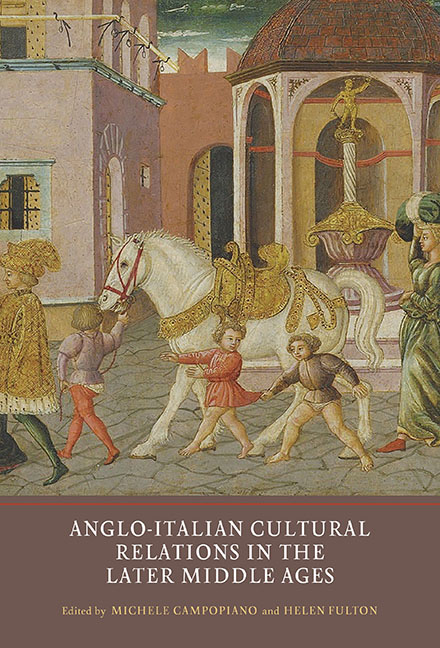Book contents
- Frontmatter
- Contents
- List of Illustrations
- List of Contributors
- Acknowledgements
- List of Abbreviations
- Introduction: Historical and Literary Connections between Britain and Italy in the Middle Ages
- 1 Writing, Translating and Imagining Italy in the Polychronicon
- 2 Richard de Bury, Petrarch and Avignon
- 3 The Reception of Italian Political Theory in Northern England: Bartolus of Saxoferrato and Giles of Rome in York
- 4 Italian Firms in Late Medieval England and their Bankruptcy: Re-reading an Old History of Financial Crisis
- 5 ‘Nostri Fratelli da Londra’: The Lucchese Community in Late Medieval England
- 6 ‘Saluti da Londra’: Italian Merchants in the City of London in the Late Fourteenth and Early Fifteenth Centuries
- 7 Political Joachism and the English Franciscans: The Rumour of Richard II's Return
- 8 Urban History in Medieval and Early Modern Britain: The Influence of Classical and Italian Models
- Afterword: The Nature of Anglo-Italian Cultural Exchanges
- Bibliography
- Index
3 - The Reception of Italian Political Theory in Northern England: Bartolus of Saxoferrato and Giles of Rome in York
Published online by Cambridge University Press: 03 July 2019
- Frontmatter
- Contents
- List of Illustrations
- List of Contributors
- Acknowledgements
- List of Abbreviations
- Introduction: Historical and Literary Connections between Britain and Italy in the Middle Ages
- 1 Writing, Translating and Imagining Italy in the Polychronicon
- 2 Richard de Bury, Petrarch and Avignon
- 3 The Reception of Italian Political Theory in Northern England: Bartolus of Saxoferrato and Giles of Rome in York
- 4 Italian Firms in Late Medieval England and their Bankruptcy: Re-reading an Old History of Financial Crisis
- 5 ‘Nostri Fratelli da Londra’: The Lucchese Community in Late Medieval England
- 6 ‘Saluti da Londra’: Italian Merchants in the City of London in the Late Fourteenth and Early Fifteenth Centuries
- 7 Political Joachism and the English Franciscans: The Rumour of Richard II's Return
- 8 Urban History in Medieval and Early Modern Britain: The Influence of Classical and Italian Models
- Afterword: The Nature of Anglo-Italian Cultural Exchanges
- Bibliography
- Index
Summary
Among the cultural traits shared across European countries in the Middle Ages, one of the most prominent elements of their common classical inheritance is often forgotten by scholars: Roman law. Commentaries on aspects of the law were produced in many European countries by the leading thinkers of the period, whose works had considerable influence upon the decisions of kings and governments. This chapter focuses upon some less well known evidence for the reception of Italian legal and political works in the northern English city of York in the late fourteenth and early fifteenth centuries, where the library of John Neuton, treasurer of York Minster, demonstrates the importance of the works of Bartolus of Saxoferrato and Giles of Rome to leading English intellectuals and practitioners of the day. The scope of the chapter is limited to the evidence concerning Neuton's library, providing a case study for further work on the holdings of the other medieval libraries in York.
The medieval study of law was based in particular on what came to be called the Corpus iuris civilis (‘corpus of civil law’), a collection of key texts of jurisprudence assembled under the emperor Justinian between 529 and 534. In the Middle Ages, this corpus ‘provided an articulated language for the public dimension of human activity necessary for a concept of political life’, defining concepts such as res publica (literally ‘public affairs’, the commonwealth) and utilitas publica (‘the common good’). The compilation was at the centre of the activity of medieval commentators, starting with the interlinear glosses by Irnerius, who taught in Bologna probably from the end of the eleventh century. Bologna became the major centre for the study of Roman law, as exemplified by the activity of the so-called Four Doctors of Bologna and of Accursius (d. c. 1263), who compiled some of the earlier glosses in the so-called glossa ordinaria. Drawing on Roman tradition, medieval commentators built theories of political relationships.
One of the theorists who built on the work of these illustrious predecessors was Bartolus de Saxoferrato (Bartolo da Sassoferrato in Italian, 1313/14–57), regarded as one of the most influential jurists of the Middle Ages.
- Type
- Chapter
- Information
- Publisher: Boydell & BrewerPrint publication year: 2018

